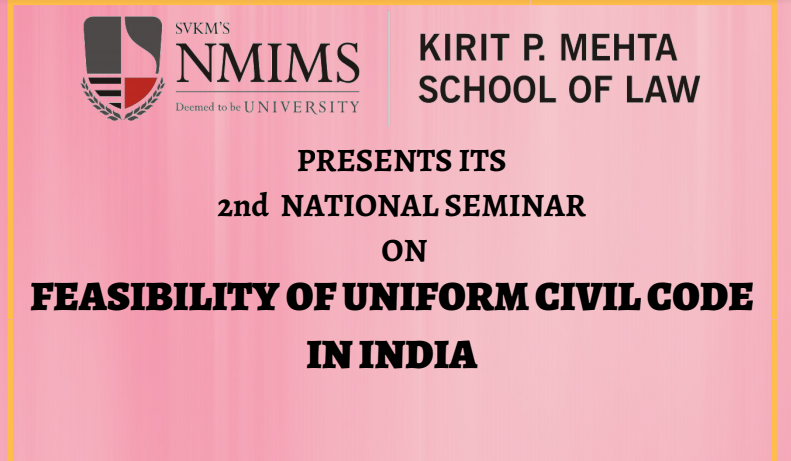NMIMS, KIRIT P. MEHTA SCHOOL OF LAW, MUMBAI PRESENTS ITS 2nd NATIONAL SEMINAR ON FEASIBILITY OF UNIFORM CIVIL CODE IN INDIA, 7th March, 2020
In the year 2018, NMIMS Kirit P Mehta School of Law set up The Centre for Excellence. This body facilitates academic research, training and extension programmes its goal being inculcating legal reasoning, and instilling within students the grit to embrace the discipline of law.
The NMIMS Kirit P Mehta School of Law Centre for Excellence in its venture to promulgate its aim of shaping the legal values of students invites students, research scholars, academicians, policy makers, practitioners, NGOs and various other stakeholders to come forward and begin meaningful dialogue by the means of thematic display of papers in an essential dissemination of knowledge.
ABOUT THE SEMINAR
The family is a diverse, strong and binding institution in the Indian society. Indian marriages vary vastly considering the variety of customs and traditions associated with them. Being dynamic in nature, changing trends are observed in areas such as age at marriage, inter-caste marriage, arranged versus love matches, matching horoscopes, etc. However, laws supporting the same are very few in number. The term Uniform Civil Code infers the same set of common laws to oversee all people groups independent of their religion, caste, and tribe. It envisions the equal treatment of citizens as per a uniformly applicable national civil code. The Constitution of India, under Part IV of Article 44 state that Part IV, Article 44 of the Constitution states that “The State shall endeavour to secure the citizen a Uniform Civil Code throughout the territory of India”.
The main motive of this Conference is to further productive discussions on the issues relating to the family and marriage, and the laws pertaining to them. It also aims to explore the possibility of incorporation of the Uniform Civil Code thereby bringing all religious and social groups under the purview of a typical stage, which is currently lacking due to the administration of differing laws in the area. The Conference also aspires to explore the role of the Uniform Civil Code in newer dimensions, and in light of the issues currently faced by the society.
THEMATIC AREAS OF THE SEMINAR
- UNIFORM CIVIL CODE
- Judicial decisions and judgements of the courts
- Need for UCC in India
- Gender justice through UCC
- International perspectives on UCC
- Religious rights and freedoms vis a vis UCC
- UCC in India and other pluralistic societies
- RAINBOW FAMILIES IN INDIA
- Queer marriages in India: Understanding the need for recognition and policies
- Queer parenting: Concerns relating to right to adoption and surrogacy
- FAMILY AND THE STATE
- Criminal law in marriage and family disputes
- Role of state in regulation of marriages
- ADR and family disputes
- HUMAN RIGHTS WITHIN FAMILY
- Understanding consent in marriage and sexual relationships
- Child rights in a family
- Maternity and Paternity rights
- Caste and its impact on family and marriages
- MARRIAGE AND DIVORCE LAW AND POLICY
- Consent in selection of partners and its impact on stability of marriages
- Marriage contracts: Pre-nuptial and post-nuptial agreements
- Concerns relating to child custody and single parent families
- Property distribution and maintenance post-divorce
- Irretrievable breakdown of marriages
- ADOPTION AND SUCCESSION LAW
- Adoption policies in India
- Human trafficking through adoption
- Issues and challenges relating to succession laws in India
- FEMINISM AND FAMILY STRUCTURES
- Feminist theories and traditional family structures
- Gender stereotypes within families and their impact on women
- Right to work: Impact of marriage on women’s careers
- GLOBALISATION AND POLITICS’ IMPACT ON FAMILY
- Changing structures of marriage, family and family life
- Transnational marriages: Law and policy
- War, internal disturbances and its impact on families d. Internet and its impact on family
IMPORTANT DATES
Last Date for Abstract Submission: 25th January 2020
Communication of Selected Abstracts: 31th January 2020
Last Date For Payment of Registration Fees: 15th February 2020
Last Date For Full Paper Submission: 1st March 2020
Date of Seminar: 7th March 2020
The dates given above will be strictly followed. The organizers may not entertain any requests for extension of deadlines
AUTHOR GUIDELINES
- Original research papers are welcome on the above-mentioned topic but not restricted to the sub-themes as given.
- The paper can be co-authored. However, a maximum of three authors per entry is allowed.
- The author(s) shall specify in the abstract and the full paper: i. Title of the paper with the sub-theme. ii. Names of author(s). iii. Name of the College/University. iv. Email address and contact number.
- The Abstract and the Full paper should be submitted in .doc/.docx format with the following specifications:
- Font Type: Times New Roman ii. Font size: 12 pts
iii. Line spacing: 1.5
- Footnotes Font Type: Times New Roman
- Footnotes : Font size: 10 pts vi. Footnotes Line spacing: 1
vii. Margin to be of 1 inch on all sides viii. Citation: Any uniform pattern of citation.
- Top 3 papers will receive cash prizes.
REGISTRATION FEES Particulars
Single Author Rs 1200/-
Co-Authors (Max. 3 authors) Rs 500/Author
Professionals /Academicians/Research Scholars Rs 1500/- Attendees Rs 500/-
The abstract, soft copy submissions and queries related to the seminar should be addressed via email to nmims.solseminar2020@gmail.com
CONTACT
Bhumica Veera (Convenor) Ph No: +91 96192 03833
Saloni Khandelwal (Co-Convenor) Ph No: +91 88888 83169
Astha Nahar (Co-Convenor) Ph No: +91 70455 16079






